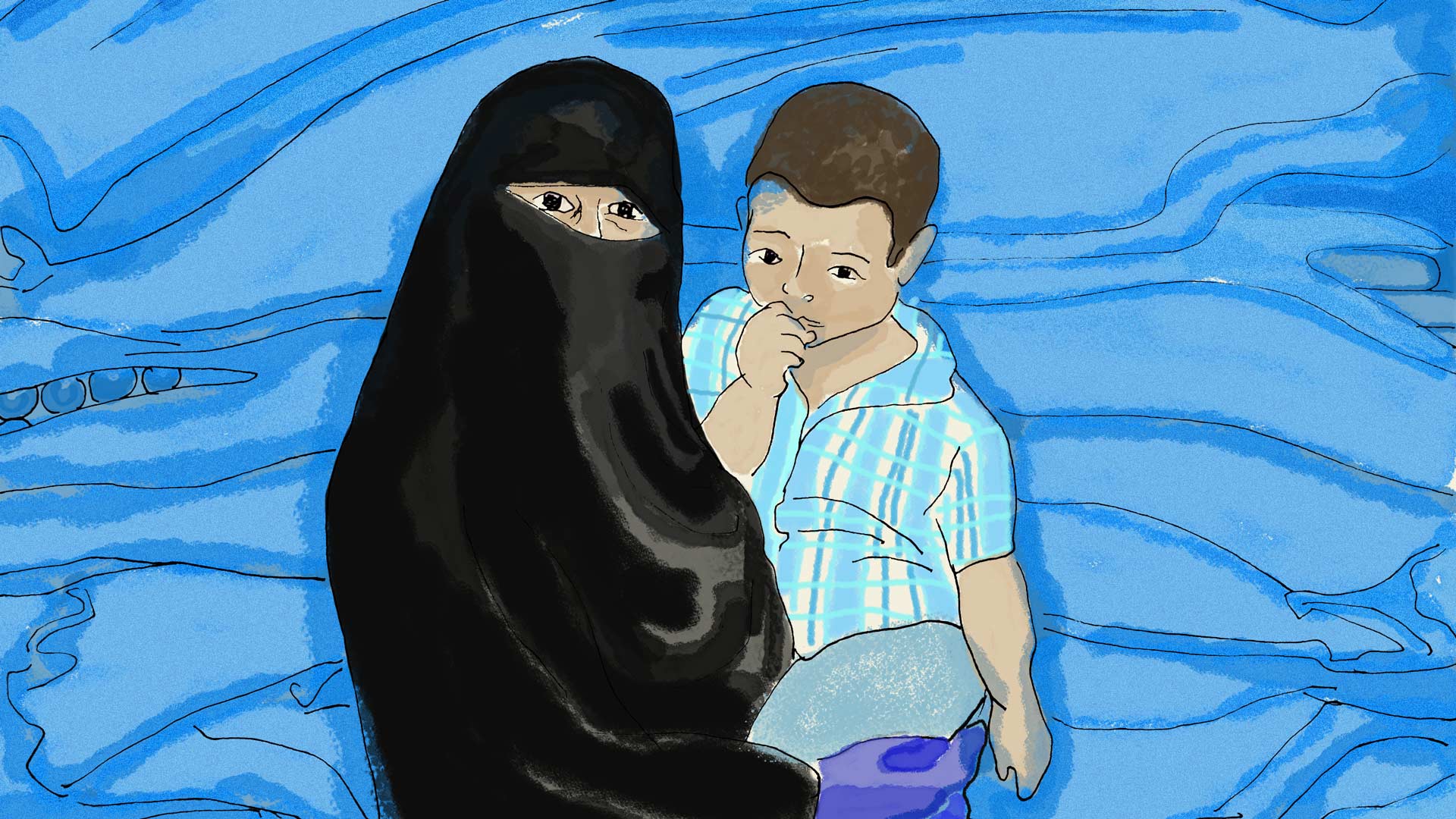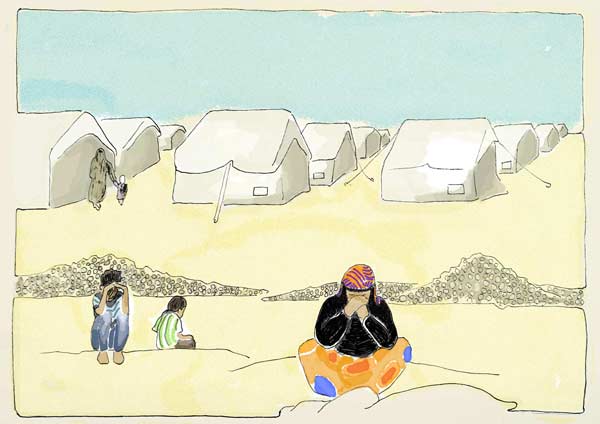
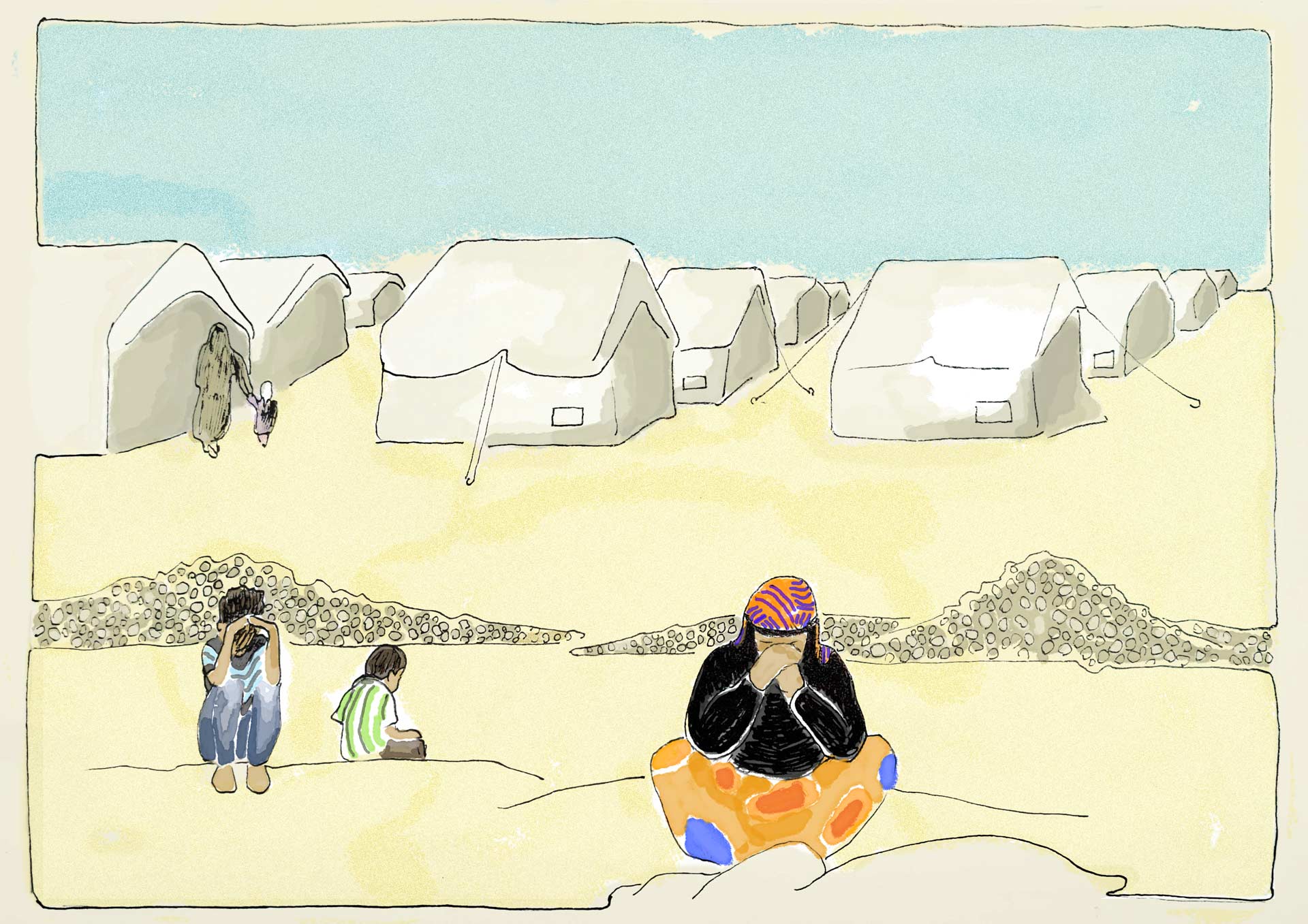
HELD IN SYRIA
The al-Roj Camp is a succession of white tents, stretching as far as the eye can see. In the middle of hundreds of makeshift shelters, Nada sits next to her eldest daughter. She tries to keep her busy by teaching her the alphabet. In the camp, there is no school, nor activities for the children. Nada managed to obtain one book from a humanitarian aid organization that supports the camp’s residents.
Since arriving to the camp, this 29-year-old Tunisian has spent most of her days inside of her tent, alongside her two children, aged five and two and a half. The family can move about within the camp, but leaving is strictly forbidden. The only contact with the outside world is by telephone.
Nada cleans other families' tents to make some money, which she uses to buy food products. The regular food supply from humanitarian groups, she says, is not enough to meet her family’s needs. Otherwise, to help pass the time, Nada hosts other women in her tent. All of them are waiting to leave this open-air prison.
The young woman left Tunisia, alongside her husband, at the end of 2015. The couple first settled in Libya, before continuing on to Syria a few months later to join, what they called, " the promised land," via the Islamic State.
But after several months in the organization, which was operating between the city of Raqqa and the governorate of Deir Ezzour, Nada and her husband tried to flee, claiming that they were no longer aligned with the organization's principles. The couple was arrested and imprisoned. They remained in one prison for several months before it was bombed in the fall of 2017 during escalations between various warring parties. Then, they managed to escape and surrender to the Kurdish forces.
Since then, Nada's husband has been held at a prison in Qamishli. Nada and her children were sent to the al-Roj camp. She hopes that the Tunisian authorities will repatriate her family back to Tunisia, even if she risks being prosecuted for her involvement with the Islamic State. Thanks to a phone and internet connection, she’s asking to return as soon as possible. " All I want to do is get out of here, we lack everything!" she exclaims.
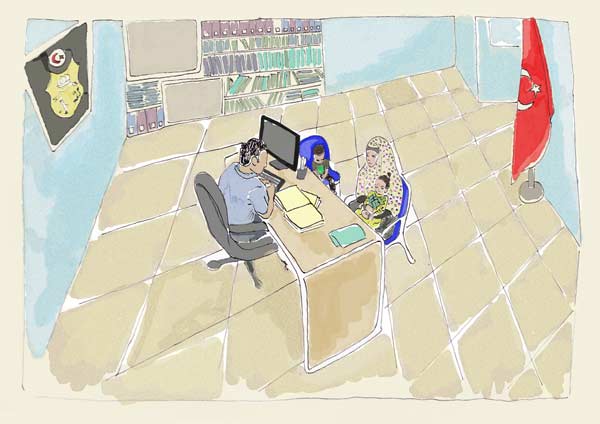
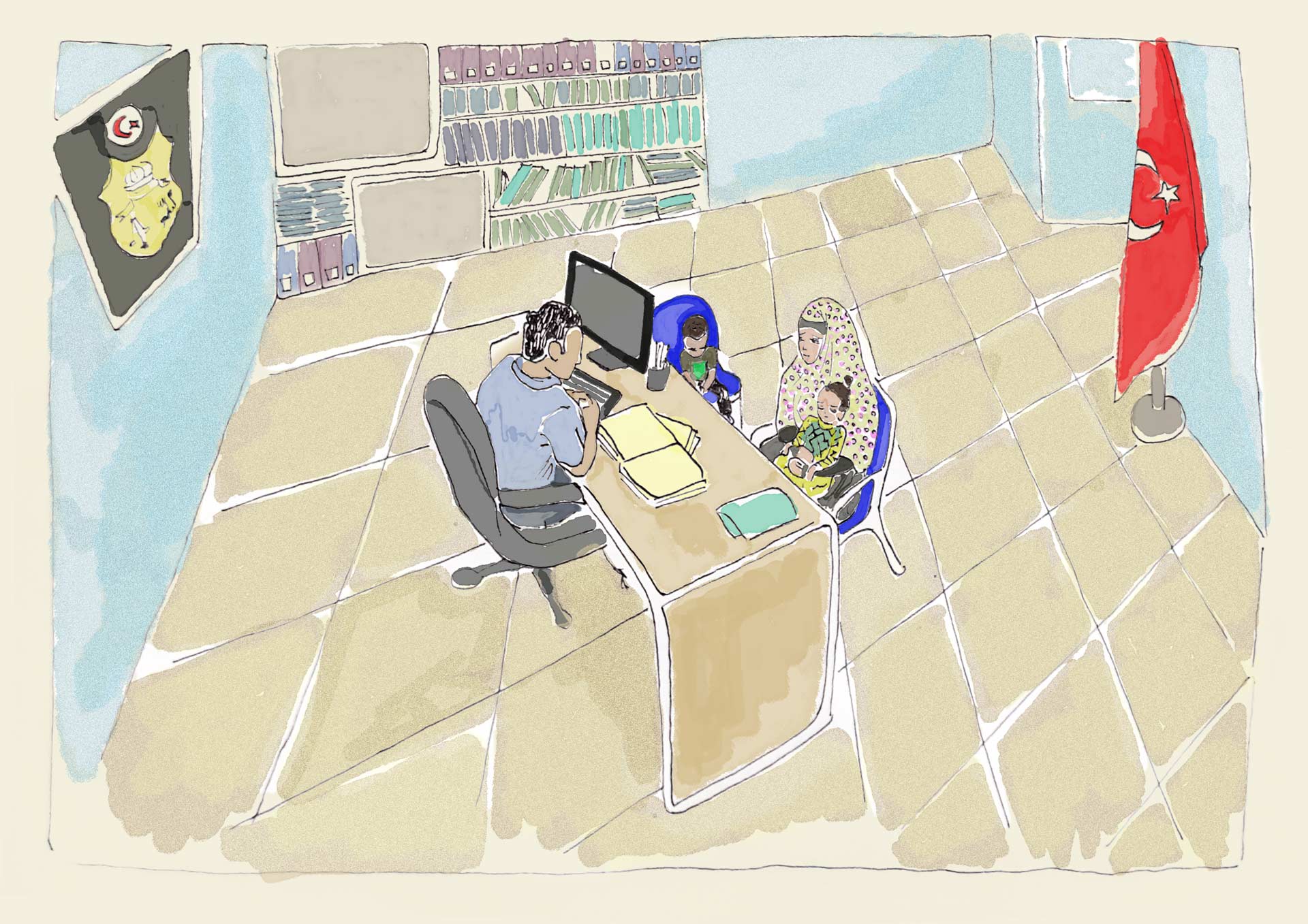
THE RETURN, VIA THE CONSULATE IN ISTANBUL
To date, the Tunisian State has not adopted a clear policy on the repatriation of Tunisian nationals who left the country to join the Islamic State. No official delegation has been sent to visit the Syrian camps that hold Tunisian citizens like Nada.
In the meantime, several Tunisian women have managed to return to Tunisia via the Tunisian Consulate in Istanbul. To get to Istanbul, they escaped from Islamic State prisons and Kurdish camps to reach, and then cross, the Syria-Turkey border. Their statements are summarized in reports written by the consulate upon their arrival. Inkyfada has obtained access to some of these documents.
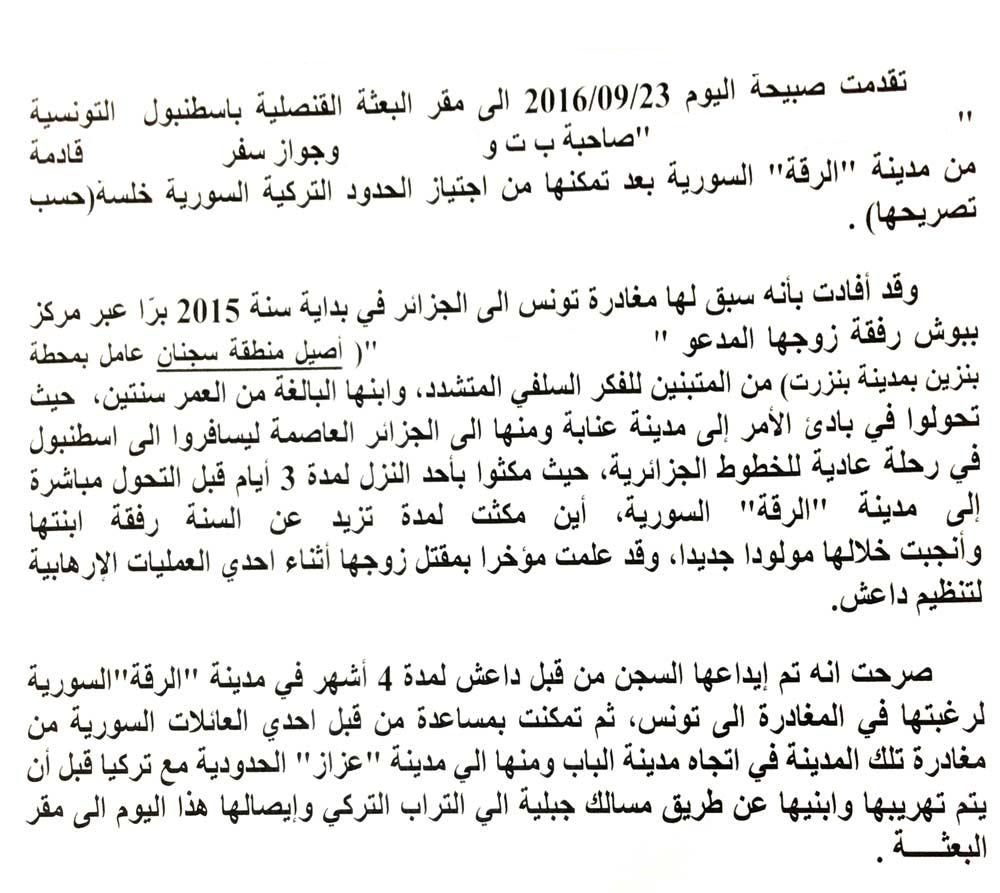

Hamida’s statement appears in an excerpt of a consular report. The consulate helped Hamida return to Tunisia.
Hamida reports that she was imprisoned in Raqqa for four months after trying to flee the Islamic State. She eventually escaped and left for Turkey with her two children. With the help of a Syrian family, she reached the border along " mountainous roads" and continued on to Istanbul.
Like Hamida, Rym was also imprisoned by the Islamic State in Raqqa. After both her first and second husbands died, both of whom were Tunisian, she decided to contact smugglers and flee. For $650, the smugglers took her and her four children to Idlib, in northern Syria, before getting them across the border.
Once in Turkey, Hamida and Rym contacted the Tunisian Consulate in Istanbul. In both cases, following interviews with consular authorities, the women and their children were repatriated to Tunisia.
Unlike Hamida and Rym, Khadija didn’t reach Istanbul under the radar. While trying to cross the Syria-Turkey border, she and her children were detained by Turkish authorities, who eventually transferred them to the Tunisian consulate. The children underwent DNA tests to prove their relation to Khadija and, thus, verify their right to Tunisian nationality.
The consular reports describe the journeys of these women in detail. But the Tunisian authorities do not provide information on the fate of these women after their return to Tunisia, such as whether they were arrested or prosecuted for having joined the Islamic State.
According to a source from the consulate who requested anonymity, 56 children and 40 women were repatriated through the consulate.
According to the same source, some Tunisian women contacted the consulate over the phone to ask to be repatriated, but when they learned that legal proceedings were being brought against them, they abandoned the idea of returning.
Caption: To return to Tunisia, several women fled Islamic State prisons and Kurdish camps to reach the Tunisian Consulate in Istanbul. From there, they could be repatriated, so long as they accepted the potential legal consequences that awaited them.
Get text from video to translate
A FEARFUL TUNISIAN STATE
But while some women and their children managed to leave the Syrian camps, others, such as Nada, remain stranded on the ground, waiting for a solution. The same anonymous source from the consulate explains that the Tunisian authorities are reluctant to repatriate their nationals because of " the lack of adequate structures to rehabilitate them." " There are fears for the country's security," she adds.
To return to Tunisia, several women fled Islamic state prisons and Kurdish camps to reach the Tunisian Consulate in Istanbul. From there, they could be repatriated, so long as they accepted the potential legal consequences that awaited them.
Tunisia’s position on repatriation is criticized by international organizations. " Legitimate security concerns do not give governments the right to abandon their nationals, including young children, detained abroad without charge in squalid prisons and camps ," says Letta Tayler, senior researcher on counter-terrorism issues at Human Rights Watch.
Similarly, Michelle Bachelet, the United Nations High Commissioner for Human Rights, opened the 41st session of the UN Human Rights Council in June 2019 by declaring that " family members of jihadists captured or killed in Syria and Iraq must be repatriated, unless they are prosecuted for crimes" and that " the continued detention of persons who are not suspected of crimes, in the absence of a legal basis and regular independent judicial control, is inacceptable."
Pressure to repatriate has also come from the United States. The US-led international coalition supporting the Syrian Democratic Forces has called on the countries concerned to repatriate their nationals in order to relieve the Kurds.
At the insistence of the United States, Tunisian authorities produced a list of about ten women and children currently held in Syrian camps. They were meant to be repatriated to Tunisia soon. But for the moment, no departure date has been set.
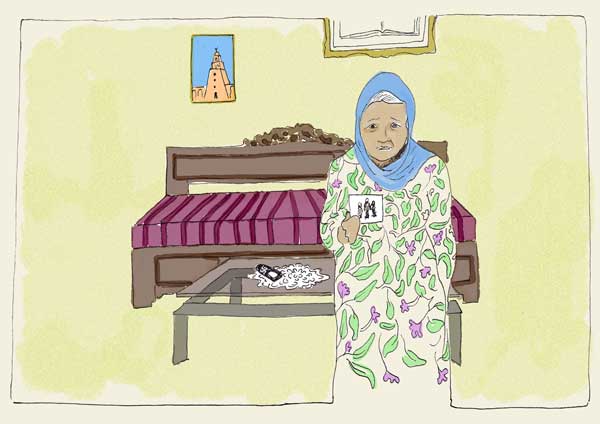
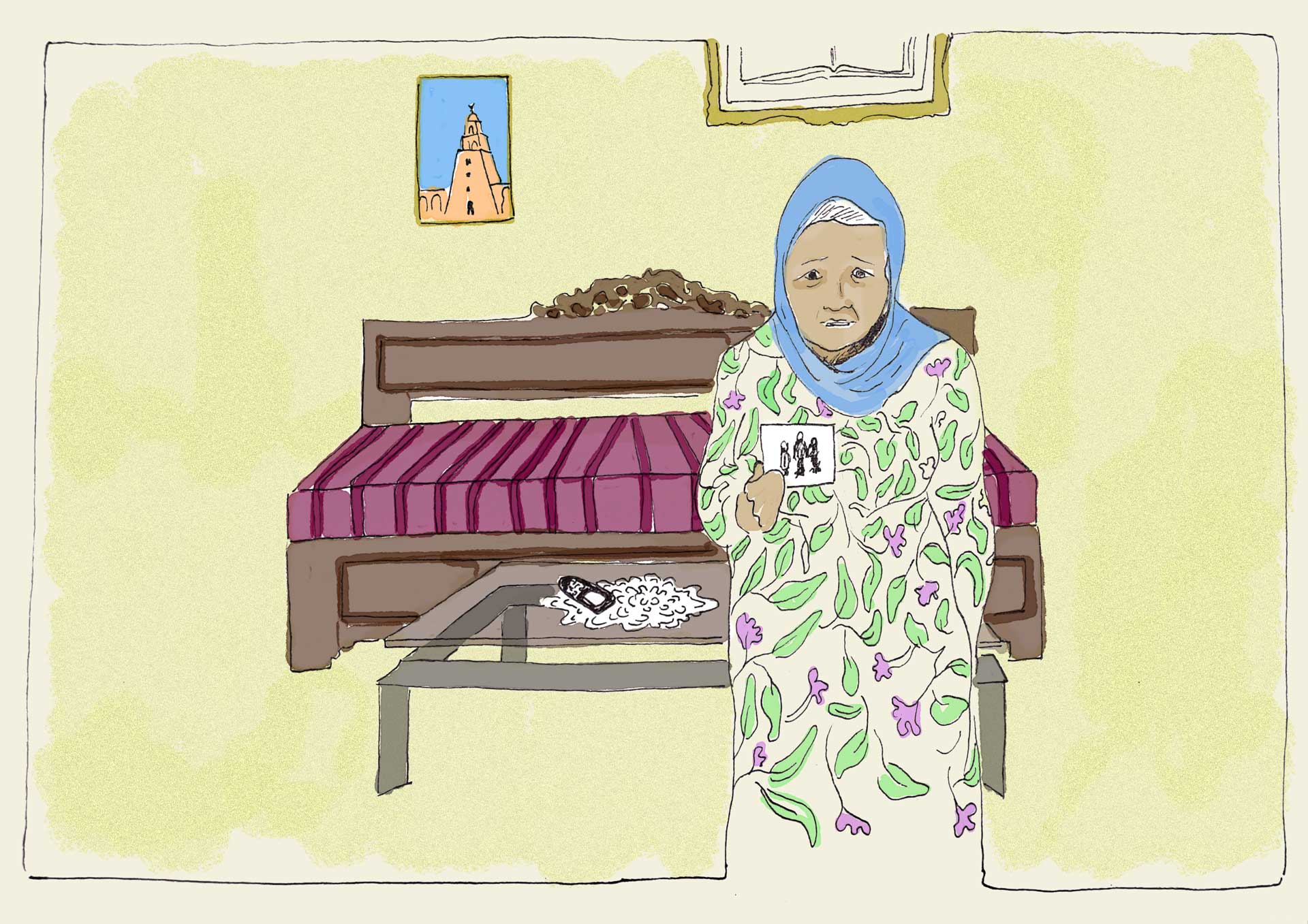
PLEAS FROM THE FAMILIES IN TUNISIA
On Tunisian soil, families are fighting to get their loved ones home, even if the government doesn’t support them.
From Kairouan, Tahia Sboui says she can't be reunited with her grandchildren, who are between 3 months and 4 years old. For now, they live with their Syrian mother in a refugee camp near the Turkish border. Their father, Aws, is dead.
Of her son Aws’s five children, only three are still alive. The other two died from malnutrition and poor sanitary conditions in the camp. " I'm losing them one after the other, and the Tunisian state is doing nothing to help me," the grandmother exclaims.
According to Tahia, the Tunisian authorities first failed her in 2012. She reported that her son had been radicalized, yet they still let him leave the country, on his way to Syria.
Fawzi Trabelsi also intervened on behalf of his grandchild, Tamim, who was orphaned and held in a prison in Tripoli, Libya. Initially, the Tunisian authorities said their hands were tied. So Fawzi went directly to the source, establishing contact with the al-Radaa militias who controlled the prison. " I explained to them that he was an orphan, and that I was his only family," he says. On this first attempt, he was unsuccessful.
But Fawzi kept trying. And after several round trips to Libya, the media picked up his story. In October 2017, the Tunisian authorities called for Tamim’s repatriation.
Mohamed and Yakine, aged 7 and 10, were also held in Libyan prisons. In the al-Jawiyyah prison of Misrata, the boys shared a single cell with their mother. From Tunisia, their grandfather was working to get them repatriated, with the help of Hakim Abou Zeguia, a Libyan lawyer. The latter managed to convince the Libyan authorities to release the children, under the condition that they would be separated from their mother, who was accused of belonging to a terrorist organisation.
" I have asked that the children be separated from their mother and brought back to their families in Tunisia," the lawyer said. When the mother agreed to let her boy and girl return to Tunisia without her, the Libyan prosecutor authorized their release. The Tunisian authorities then took charge of their repatriation.
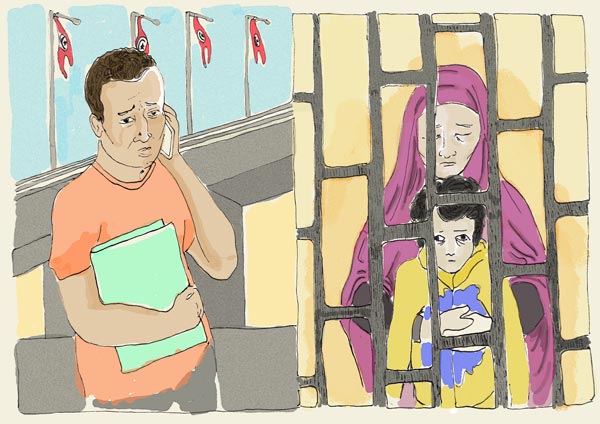
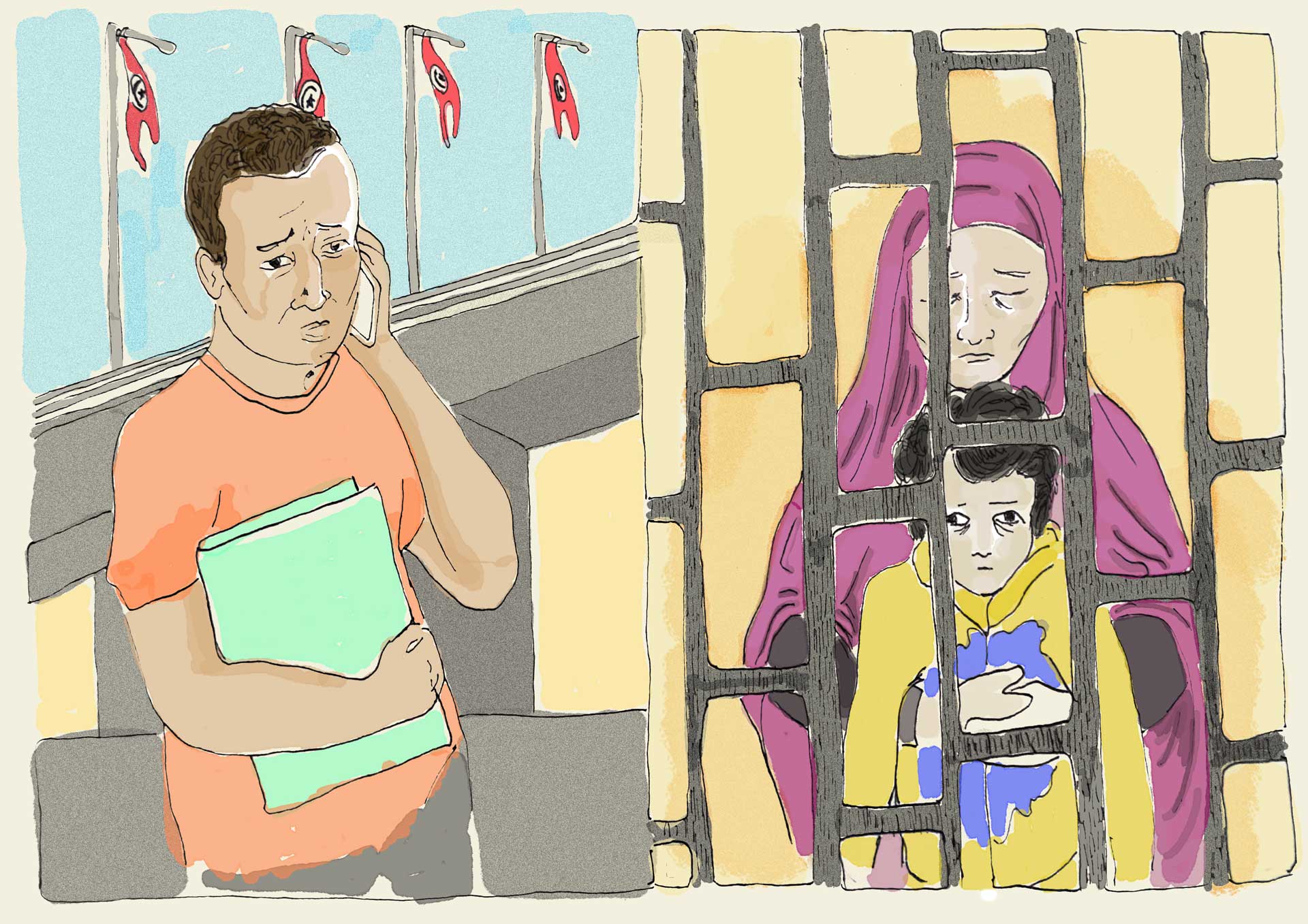
IMPRISONED IN LIBYA
Other Tunisian citizens remain stuck in Libya for the time being. For three years, Moncef Abidi has been trying to get his sister, Wahida Rabhi, and his nephew Baraa released from a prison in Tripoli.
Wahida joined the Islamic State with her husband. After their marriage in 2012, and while pregnant, the couple left for Libya, where they stayed for a month. From there, they flew to Turkey, where Wahida gave birth to her child. But their sights were still set on Syria; the family finally left to Raqqa in 2014.
At that time, fighting had escalated between the Islamic State and the Jabhat al-Nusra group, and Wahida’s situation became complicated. Not after long, Moncef says, his sister wanted to return to Tunisia with Baraa, " but her husband threatened to take her son away from her, if she ever tried to leave."
Eventually, the family managed to flee Syria and return to Sabratha, Libya. But in February 2016, during an American raid, she and her son were seriously injured, and her husband was killed. The mother was then taken to the Mitiga prison in Tripoli and separated from her son, who was due for surgery. Wahida waited seven months - without news of him - before they were reunited in prison.
For three years now, the two have remained imprisoned in Tripoli. Wahida maintains regular phone contact with her brother Moncef, but for the past six months, he has had nothing to report back. He has no idea where their case currently stands.
According to official figures from the Tunisian Ministry of Foreign Affairs, 14 Tunisian women and 22 Tunisian children are currently in this prison. Further east, in Misrata, 17 other children live in two care centers. About ten of them are cared for by the Libyan Red Crescent.
In January 2019, the Libyan Red Crescent called on Tunisian authorities to repatriate six orphans who had been in their care since 2016. The organization claimed that it could no longer " continue to be responsible for them" and threatened to abandon the children if the Tunisian State didn’t take charge of the situation.
In response to their statement, an official Tunisian delegation traveled to the Libyan Red Crescent center. The delegation’s forensic police took DNA samples from the six children to establish their genetic link to the country and thus their right to be repatriated. But since the tests, no further action has been taken, and the orphans remain in Libya.
Since 2017, Khaoula Ben Aicha, an MP on the parliamentary Committee on Affairs of Tunisians Abroad, has called on the Minister of Foreign Affairs to take up the issue of Tunisian women and children held in Libya. According to the member of parliament, an agreement has been slow to reach because Libyan authorities demand the repatriation of women and children, as well as the 80 corpses of Tunisians who died fighting for the Islamic State, while Tunisian authorities only want to repatriate the children.
In a letter to the MP, dated August 8th, 2018, the Ministry stated that it would " do its best to repatriate these children," while taking into consideration " the specificity of this case given the security conditions in Libya and the diversity of parties involved on the Libyan side."
Despite sending several official delegations to Misrata and Tripoli between 2017 and 2019, the government has not moved any closer to repatriating these Tunisians. Many people have pressed for information, but the Ministry has failed to provide any updates on the matter.
Until the fate of these Tunisian nationals is decided, friends and relatives like Moncef wait in despair.
" Wahida and Baraa are in danger, as are other women and children! The prison can be bombed at any time," he worries. UNICEF recently issued a statement warning of “ an increasing number of children at imminent risk of injury or death because of the escalation in fighting – the worst in years – in and around Tripoli.”
From Tunisia, the Rescue Association of Tunisians Trapped Abroad (RATTA) monitors the situations of 93 children and 23 women confined in Libya, Syria, and Iraq. They also send appeals to Tunisian authorities calling for their repatriation. For Mohamed Ikbal Ben Rejeb, RATTA’s president, " these children, who are between 4 and 6 years old, are the forgotten of the Tunisian State."
AN INTERNATIONAL PROBLEM
insert graphic
In February 2019, Human Rights Watch estimated that 100 women and 200 children claiming Tunisian nationality were detained in prisons in Iraq, Libya, and in three camps in northeastern Syria: al-Roj, Ain Issa, and al-Hol.
The Tunisian State, however, has not provided any statistics on the number of women and children in this predicament. The only figures available indicate that 3,000 Tunisians left the country to join the Islamic State. But this number is contested by other organizations who report more than 6,000 Tunisians-turned-combatants
insert graphic
As of now, about 1,000 Tunisian combattants have made their way back into the country, according to the president of the National Counter-terrorism Commission, Mokhtar Ben Nasr. With regard to the repatriation of women and children, only Mohamed, Yakine, and Tamim have been officially repatriated from Libya.
